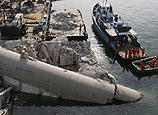
NEW YORK, May 9 (Xinhua) -- To end "too big to fail" needs hard work of learning what it takes to make all firms safe to fail without government rescues, Jeffrey M. Lacker, president of the Federal Reserve Bank of Richmond, said here Thursday.
Lacker made the remarks at a meeting of Council on Foreign Relations. He believed that two "mutually reinforcing problems" existed in "too big to fail".
"First, creditors of some financial institutions feel protected by an implicit government commitment of support should the institution become financially troubled. Second, policymakers often feel compelled to provide support to certain financial institutions to insulate creditors from losses," he said.
According to him, it's essential to eliminate the government backstop implied by 'too big to fail', as "ambiguous commitments induce fragilities that in turn induce intervention that expands implied commitments."
If policymakers can achieve the commitment and make it credible to market participants, they can improve private sector incentives to avoid fragile financing arrangements and limit risk-taking, thereby reducing the pressure for government intervention, he said.
The term "too big to fail" emerged following the financial crisis in 2008. It asserts that failure of large financial institutions would be disastrous to the economy, thus must be supported by government when they are in distress.
The problem has prompted heated debate and resulted in the creation of the Dodd-Frank Wall Street Reform and Consumer Protection Act of 2010.
"Allowing a financial firm to fail without government support for creditors does not mean that the operations and activities of the failing firm will simply come to an abrupt halt," Lacker said.
"Our goal should be for the bankruptcy of a large financial firm to be as much of a nonevent as the bankruptcy of a large airline," he noted.
Under a provision of the Dodd-Frank Act, bank holding companies with total consolidated assets of 50 billion U.S. dollars or more and nonbank financial companies are required to draw up detailed plans for their orderly resolution in bankruptcy, without government assistance, and submit them annually to the Federal Reserve and the Federal Deposit Insurance Corporation.
"I believe that these resolution plans, also known as 'living wills', represent the most promising path toward ending 'too big to fail,'" Lacker said.
"The living wills program will require more hard work and detailed analysis. But I see no other way to reliably identify exactly what changes are needed in the structure and operations of financial institutions to end 'too big to fail,'" noted the Richmond Fed president.
















 S China city looks like Venice after heavy downpour
S China city looks like Venice after heavy downpour


![]()
